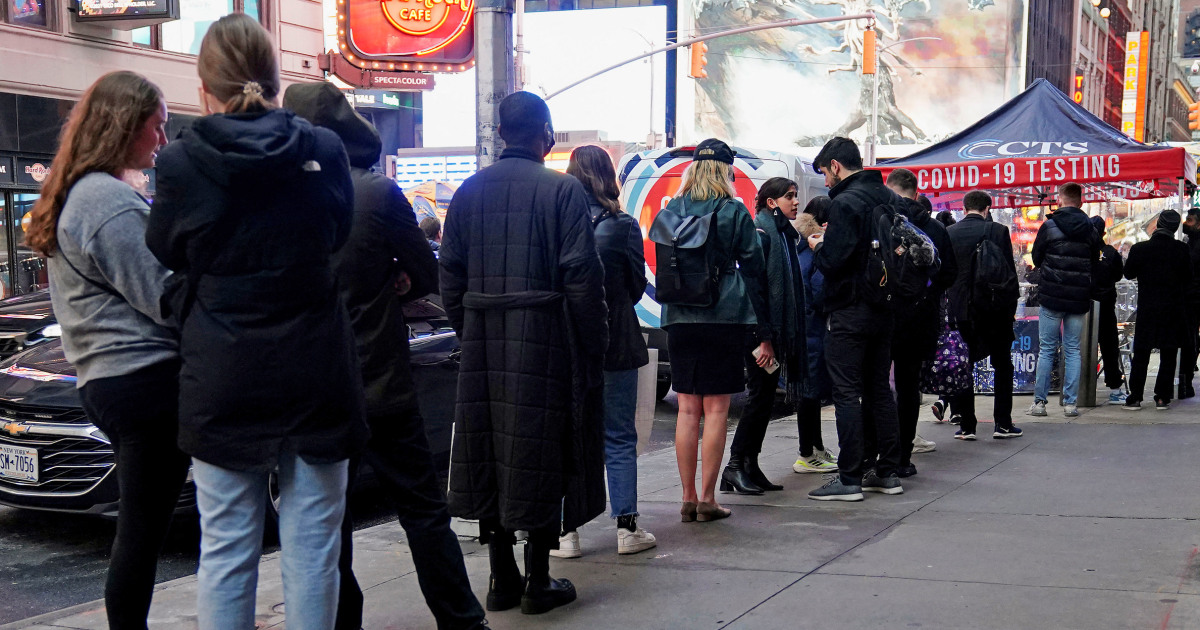
Nobody tells Silicon Valley and Wall Street bigwigs what to do — except, of course, the fast-spreading Covid-19 omicron variant.
Mere weeks ago, corporate America was looking ahead to 2022 as the time when finally, belatedly, the workplace would go back to normal. Now, those plans are scrambled, and human resources experts say the setback is yet another blow for executives who tried to project decisiveness in the face of a rapidly evolving threat and beleaguered workers alike.
“Employers are now realizing it’s not feasible to return employees during yet another surge in the infection,” said Dr. Neal Mills, chief medical officer at consulting services company Aon.
It’s another blow for executives who tried to project decisiveness in the face of a rapidly evolving health threat.
The jump in cases already is having an impact in some places: Foodie blog Eater NY counted 12 New York City restaurants that have announced temporary closures as cases rise, with owners citing a need to protect their staffers and patrons.
Omicron forced tech titans to retreat: Google parent Alphabet and Apple both abandoned timelines that would have brought workers back to offices in January and February, respectively.
Numerous boldface names in the world of finance have also backed off in-office work. Citigroup said employees in the New York City metro area can work from home through the holidays, according to Bloomberg. Citi has plenty of company: Bloomberg also said investment bank Jefferies Financial Group, hedge fund Citadel, along with asset management giants Blackstone and Carlyle Group, all issued directives permitting employees to work remotely once again.
It’s an awkward spot for many of these companies to be in, since many had been vocal about their desire to see people back in the office. In an interview with CNBC, Morgan Stanley CEO James Gorman — who had earlier pushed for a Labor Day return to the office — admitted, “I was wrong on this.” He predicted that the current holding pattern could stretch well into 2022, saying, “everybody’s still finding their way.”
A recent survey of CFOs conducted by consulting firm Deloitte found that 88 percent expect hybrid work to be a fixture at their company in the upcoming year. Steve Gallucci, Deloitte’s North America leader of the CFO program, said it was a tacit acknowledgment that even the best-laid plans are no match for a pandemic.
“They’re recognizing that for many industries, a hybrid approach is quite attractive to both the employee and the employer,” Gallucci said.
“The biggest challenges came from those that were the most optimistic” in planning their return to the office, Mills said. The prospect of another setback is yet another blow to the already sapped morale of workers. “There has been some loss of confidence from employees,” he said.
Johnny C. Taylor, Jr., president and CEO of the Society for Human Resource Management, said companies whose top brass were vocal about their distaste for working from home have been left in a tough spot as a result.
“When you announce that you’re going to push off the return to work, there is a tacit acknowledgement that you’re going to be impacted negatively as a company,” Taylor said.
There is also considerable uncertainty on the vaccine front, with no clear answers about how vaccine mandates — or lack thereof — will impact people’s willingness to re-engage in a traditional office setting. SHRM found in a November survey that 51 percent of employers with workforces of more than 100, which would be subject to President Joe Biden’s federal vaccine mandate, are waiting until legal challenges to the mandate are settled. Three-quarters of survey respondents said that if the directive does not hold up in court, they are unlikely to impose their own vaccine or testing requirements.
Deloitte’s CFO survey turned up similar findings, with 52 percent of respondents anticipating vaccine requirements for employees working on-site.
The cumulative effect is one of exhaustion. In a recent survey, Taylor said, “One in four employees have said they’re feeling isolated, depressed and a little hopeless because of the need for human interaction, and that’s playing itself out in the workplace from a mental health and wellness perspective.”
One in four employees have said they’re feeling a little hopeless because of the need for human interaction.
“There is definitely Covid fatigue. Omicron is just adding to that overall feeling,” HR consultant Art Glover said via email. “It appears to be one long, continuous slog through this pandemic, with the ongoing threats of infection ebbing and raising.”
Despite the push on the part of CEOs to bring workers back into the office, many people have realized they can be more productive from working at home — an unintended consequence that has benefitted companies facing climbing payroll costs in a tight labor market. This could backfire, though: The added productivity that comes when people are working from home can quickly become too much of a good thing if it triggers employee burnout or departures, Taylor said.
“It creates a real tension. On one hand, we as employers know great productivity is good,” he said. “But if they become less effective and productive over time, then you’ve shot yourself in the foot.”
Source: | This article originally belongs to Nbcnews.com










